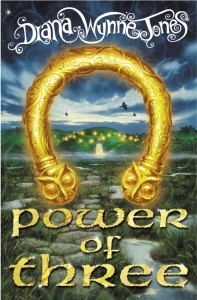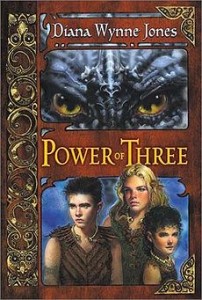Risking Delight — The Awesomeness of Diana Wynne Jones & “The Power of Three”
 Recently on the Supernatural Underground I posted “All About… The Awesomeness of Story” (which may be a post worthwhile reading in and on itself—just sayin’ 😉 )
Recently on the Supernatural Underground I posted “All About… The Awesomeness of Story” (which may be a post worthwhile reading in and on itself—just sayin’ 😉 )
A long while before that, around about the time I first started blogging and learned of Diana Wynne Jones’ terminal illness, I posted here about her profound influence on me as first a reader, and subsquently an author. If you’re interested, you can read that tribute, here.
A book I specifically mentioned then was Power of Three, as follows: “[her]… first book I recall reading was A Power of Three—and I loved it.”
I mentioned Power of Three again in the Supernatural Underground post, because—unable to resist temptation—I had finally (all these years later!) bought myself a copy of my very own. Yet there is always some trepidation in sitting down with a book you have loved as a kid or teen because there are some tales, alas, that do not stand the test of re-reading with adult eyes well.
At that stage, although I had only just dipped into Power of Three again, here is what I was already feeling:
“—but what a wonder of magical-ness it is. It isn’t just the actual magic given Wynne Jones’ is a pre-eminent Kids/YA Fantasy author. It’s her use of language, and the way she captures people in all their humanness, as well as a kid’s eye view of the world, and the delight of telling life — as Emily Dickinson would have it — “slant.”
Perhaps most of all, as a reader, it’s the sheer awesomeness of putting yourself into the power of a master storyteller — and knowing you are in safe hands.”
 Now I have completed my re-read of the book — and you know what, I still feel exactly the same. Power of Three really is storytelling at its best. To the comments I have already made, I would like to add the following: humour! This is not what I would call “laugh out loud” funny, but I certainly caught myself reading with a broad smile on my face — best of all it’s “laugh with us” humour: we are laughing at ourselves and with ourselves in the very best kind of way.
Now I have completed my re-read of the book — and you know what, I still feel exactly the same. Power of Three really is storytelling at its best. To the comments I have already made, I would like to add the following: humour! This is not what I would call “laugh out loud” funny, but I certainly caught myself reading with a broad smile on my face — best of all it’s “laugh with us” humour: we are laughing at ourselves and with ourselves in the very best kind of way.
I would also like to specifically mention the characters because there are quite a few of them: Gair, Ayna and Ceri; Gerald and Brenda; Hafny and Halla; Adara, Gest and Hathil—just for starters—but every character is vital and real and well drawn. The plot is rather complex, too, but as a reader I barely noticed because it worked! And altogether because of the magic and the characters, the humour and the plot that worked, and the human-ness and the wonderful language—well, I enjoyed my time within the pages of Power of Three thoroughly.
When I closed the covers, I felt thoroughly satisfied. Yet I also felt something more, something as important to me as a writer as it is as a reader. The US poet, Jack Gilbert, wrote (in ‘A Brief for the Defense‘) that: “We must risk delight.” On re-reading Power of Three I experienced delight both as a reader and as a writer reading another author’s work. This suggests to me, quite powerfully, that Diana Wynne Jones risked delight when she wrote the book — and that, I believe, is something all those who wish to be an author must do, every time we pick up our pen (or keyboard) and write.
—
- My first tribute to Diana Wynne Jones is here
- “Diana Wynne Jones, 1934-2011: A Personal Tribute” is here.
- I also really recommend Neil Gaiman’s tribute here, because it encapsulates knowing Diana Wynne Jones as both a friend and an author.








Diana Wynne Jones’ books are a delight to read and Power of Three is one of my favourites. What I liked most about it when I first read it was identifying myself as a ‘giant’. Then I moved on to marvelling at how well drawn the characters are – not perfect people but trying. Gair’s initial disillusionment with his father, followed by a greater understanding of what is really behind a hero story, and then once again, as in Fire and Hemlock, finding out that being a hero sometimes means overcoming an embarrassing situation. There’s just so much in it! I recently started reading a book called Reflections, essays by Diana, and in one of them she takes about laughing her way through writing one of her books – I think it was a scene in Black Maria where Chris jumps through the room in Aunt Maria”s baghdads. So I think she got as much pleasure from writing as we do from reading her books.
Thanks for commenting, Natalie (and welcome, by the way, to ‘…on Anything, Really’ :)) I agree with you that there is “just so much in it” and in an entirely good way. And Diana’s anecdote of laughing as she is writing rings so true—this is indeed ‘risking delight.’ But as importantly, sharing it, too.
A lovely post Helen. Risking delight would be about the best thing anyone can do in any one day I reckon. I think Diana’s books may be a delight awaiting me. Thank you. 🙂
Helen, if you have not read already then I definitely recommend almost any Diana Wynne Jones novel I can name. ‘Power of Three’ is a favourite obviously, but Eight Days of Luke, Dog Star, Cart & Cwidder, Howl’s Moving castle, are all reads I have enjoyed—& then there are the ‘Chrestomanci’ books.
Thanks, Helen.
Ironically, the first book by Jones I came across was not one of her straight up works of fiction, but rather her Tough Guide to Fantasyland…
I think the “Tough Guide” has become something of a classic and for the best reasons. And although I know your TBR table is piled high, if you have not already read a Wynne Jones novel, I recommend Power of Three, although Eight Days of Luke is also a favourite.
Heya, I am a long-time lover of Diana Wynne Jones’ books, but have just read Power of Three for the first time. She is such a prolific writer, I am taking a while to make my way through her collection (partly because I also like to re-read my favourite ones).
I was wondering if you could settle a question I had about the ending.
***spoiler alert***
It mentions in the last few paragraphs in the book that Ceri put a Thought onto Gair.
Did he make him want to sacrifice himself, or did he save him from having to be sacrificed?
Are we supposed to not be sure what he did, or am I being a little dim?!
I would appreciate your thoughts!
Cheers, thanks for the review
DWJ books I rate very highly include ‘Eight Days of Luke’ and ‘Cart & Cwidder’ and although I haven’t read it yet, many people I know highly recommend ‘Fire & Hemlock.’ 🙂
Regarding the ‘thought’–I think Ceri actually puts it on everyone, to make them feel happy and kind of cement the new rapprochement between them all (if you know what I mean.) That’s how I read this anyway:
‘…Gair felt a wave of happiness flood over him. Everyone felt it. The hall was suddenly full of people laughing, shaking hands and shouting greetings … [further down the page] … Gair… began to wonder why this happiness went on and on. He understood as soon as he looked at Ceri. Ceri’s was the only sober face in the hall…”
Hope this helps! 🙂